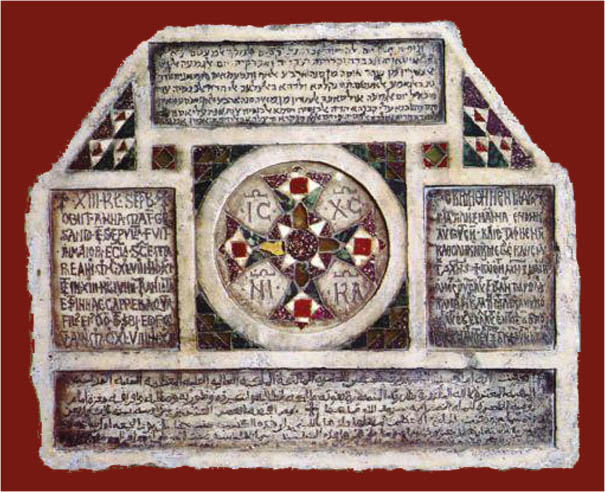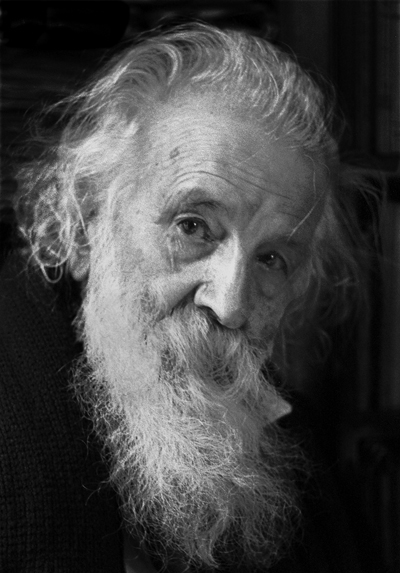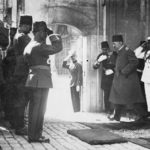
As heir to the Judeo-Christian tradition and presenting itself as the final, ultimate achievement in the sense of the perfection of prophecy - and consequently of morality - Islam, as a means in itself of foresight and decision, purely and simply expels the exercise of Reason and by that very fact demotes the individual to a minority status, as much in term of knowledge as of action. What follows from this is that the prevailing operative law can only be one of heteronomy [1].
THE BELIEVER, under this heteronomy, can only sustain himself to ‘walk on through this life’ and prepare for his entry to an otherworldly paradise by the observance of divine commandments purporting to be valid for all people and for all time. He must also obey the Sunna and the Sīra[2] which are themselves embellished by the exemplary conduct of the successors of the Prophet. All then that remains to Reason is the meager domain of muʽāmalāt (‘human interaction’).
To this might also be added ijmāʽ, which we could translate as ‘consensus’ and which is nothing more than the unanimous agreement of those learned in matters of faith, who enlighten the Nation on this or that point of doctrine, so that Reason’s only function is purely and simply to obey these four sources of authority, without which the believer cannot be considered a believer. In short, beyond these heteronomous ‘instructions’ which are, to quote Descartes, ideas that are ‘received’ from the outside, there is no salvation at all.
Moreover, by delegating the power both of reflection and action – which define what it is to be human – the believer is deprived of his power to be reasonable and sees himself reduced to the level of a slave (‘abd)[3] as a created being and one destined for servitude. Seen like this, he is necessarily a servile creature without any salvation and or any status outside the path prescribed for him by the heteronomy.
From this point of view, all the conditions are there to ensure that autonomy – a precondition for the elevation of Reason and its concomitant free will to the rank of morality and truth – can never emerge.
Given such a state of affairs, would it not be useful – just once in our life – to ask ourselves a few crucial questions such as: how does one explain the impossibility of a Descartes emerging in the Islamic world? If the West, ever since the original Greek impetus, has been motivated, as Bachelard[4] put it, by the logic of the ‘liquidation of the past’ – for what ontological or historical reason is it that Islamic culture, even when it engages in reform, continues to accord the past a respect for tradition that Islamic culture historically or in the future will never deny?
All the conditions are there to ensure that autonomy can never emerge
Did not the West experience a Reformation, whereas the Islamic world has experienced merely a ‘revival’ – which is actually a return to the past with a modern armoury derived from the Enlightenment, as a consequence of Napoleon’s expedition in Egypt?
To translate this ‘renewal’ with the term ‘reform’ is, in my eyes, a contradiction of monumental proportions, since (should I need to remind you) reform in the West was assured only at the cost of much blood spilt in a consecration, if I may so put it, of the revoking of the Edict of Nantes,[5] and paid for by the famous St. Bartholomew’s Day massacre.
What is the obstacle that has taken up residence in the Arabic language and through which the Arab individual engages with the world that he inhabits? Where should the blockage be located, if blockage there be? In other words, what would be its topos? Could it be the language itself, and as such something deep in the past, since it is experienced in the very fact of existence and constitutes its absolute culmination?
Such a thing would be entirely comprehensible and explained firstly by a tribal or pre-Islamic past, such as the time of the ancestors’ glory, for which the individual acts as a sounding board and, secondly and consequently, by the absolute requirement made of the believer that he never so much as touch the ‘founding principles of faith’ under pain of capital punishment (if I may so put it). The future, therefore, can be none other than an eternal re-emergence of this inaugural moment. It even marks the fabric of the age, the era of the famous ancestors of the pre-Islamic period and the glorious era of prophecy, which by closing off and culminating within itself all that constitutes the Good, leaves nothing else to be pondered, nothing to events; that is to say, to the emergence of anything new, or nothing to play or to an importation of any sense or orientation that can open up human life?
To translate the term ‘renewal’ with ‘reform’ is a contradiction of monumental proportions
But is this due to some chance? Could it not be explained by the fact that Islam, as the heir to Judaic Messianism, is a fundamentally historicist religion in the sense that Karl Popper meant it[6]. In other words, as regards this obstacle to the unfolding of time, coming as some absolute break with what went before (the very thing that we are searching for here), did some type of historicity exist in the ontology of the time that would explain this prioritising of the past over the future? Could it be due to a simple or unknowable accident, which could be explained as much by external causes as by some historic manifestation? Or, in contrast, is it to be explained by some ontological causes going to the very essence of Islam and dictated by the requirements of the language itself, causes which have set up a barrier to the emergence of any privately experienced temporality, and thus any subjective morality – anything, that is, that comes under the sphere of the ‘private’?
For in Islam everything is public in the sense that one’s private life lies entirely under the yoke of a public life punctuated by reverence for the precepts of the faith, so that the sphere of privacy is still perceived as a sphere of evil – be it one of plots hatched against the Prince of the Faithful, or one of debauchery. Is this not dictated by the Arabic language itself as it is the language of the Qur’ān since, as the famous saying goes, ‘the limits of my language are the limits of my world’?[7]
And indeed, one should note that where Islam prescribes that the exercise of reason should be confined solely to the sphere of muʽāmalāt (‘human interaction’) and not touch upon ‘principles of faith’ (arkān al-īmān) on pain of the charge of heresy, the Cartesian system for its part proposes an opposite approach, one – to be precise – of
‘seriously undertaking once in [one’s] life [to be] rid of all opinions whose claims [one has] accepted up to then and beginning afresh from the basics,[8] if one wants to establish something firm and constant in the sciences.’[9]
I note in passing that the attempt to re-think the principles (usūl, arkān or mabādi’ al-ʽaqīda) is conceived in Islam as a bidʽa (‘innovation’) the punishment for which, lest we forget, is the death penalty, and which is the most striking proof (need one spell it out?) that mankind is here called upon to renounce the exercise of something that constitutes the very distinguishing mark of his humanity: reason and free will, in the sense of reasoned will.
The future can be none other than an eternal re-emergence of this inaugural moment
Thus, even for the one who, against all odds, follows in the footsteps of Descartes in uprooting prejudices and awakening reason’s power to strip away things, there can be in Islam neither ‘citizen’ nor ‘individual’; the only type of human being allowed there is the believer (al-mu’min bi-Llāhi wa bi-rasūlihi – ‘the believer in God and his Messenger’).
Indeed, as regards the man, in Islam what defines him is not what is irrepressible in him – the exercise of Reason and free will as the properties of one who is morally and legally an adult – but his status as a believer who is content to be a sounding board for that four-fold tradition [the Qur’ān, the Sunna, the Sīra and Ijmāʽ]. We could go further: man is a minor whose sole function is to prostrate himself and bow down to the omnipotence of tradition, so much so that one might be mistaken for considering that, alongside the Jew and the Christian, he is a dhimmī, a legal minor who – literally – has no right to a voice.
It goes without saying that the status of minor has here an eminently legal and political sense which (surely no coincidence) has an impact on the concept of ‘citizen’ in that in Arabic it only means an ‘inhabitant of a country’, or a national (al-muwātin), who enjoys neither ‘right of blood’ nor ‘right of soil’.[10] On the contrary, in the Arabic language in its capacity of the language of the Qur’ān, the ‘person’ (al-shakhsiyya) is understood as the very antithesis of the notion of the person in the legal and moral sense established, against all odds, by the French Revolution. This is because the Arabic term shakhsiyya signifies ‘one who has a reputation and is untouchable’ in the sense of being above the law. In this sense, the Muslim is deprived of all power since the former conception, where Human Rights establish the Person as a liberty and the rights of the Citizen confer power upon it, is antithetical to the prevailing situation in Islam.
My final conclusion, therefore, is that all that Islam is capable of doing is to produce ‘fundamentalists’ whose function is to be integrated from the outset into the sphere of the status of a minor, and to abdicate reason’s power to criticise. It is only under these conditions that he is held to be a mu’min (‘believer’). In this sense the Muslim believer has rights over and above the man and the citizen. From this point of view, does one have to spell out the fact that the issue of the Islamic revelation, embodied and seconded by history, is less one of shaping the man and the citizen than of educating the believer to delegate authority to God and His representatives. These representatives, in fine Kantian logic, hasten to become his guardians, or rather, obstacles standing in the way of his building an autonomous conscience and, as such, one capable of establishing laws.
Conversely, in other lands and as a result of the Greek impetus (as Beaufret put it, and as Rousseau gave clearest evidence of it in exploiting the breach opened up by Descartes), mankind has set himself up with an autonomous, legislative power, expelling God from the political scene. Similarly, Kant put an end to the hegemony and the imperium of God in the universe of knowledge, something which Marcel Gauchet summarises perfectly when he says:
As citizens, none of us can any longer see ourselves directed by what lies beyond. The City of Man is the work of man, to the point that now, in the eyes of the most zealous believer in our lands, it is impious to mix God up either with the order that binds us together or with the disorders that divide us. In a word, we have become, metaphysically, democrats.
[1] In this sense the author is referring to the individual deferring to moral laws that do not have their origin in his own reason but are instead given to him from the outside. The result being that the individual is not morally autonomous, but rather abdicates moral judgement to an authority (be this God, the state, one’s ancestors, or historical necessity) that lies outside of himself. (Ed).
[2] For these terms, see Glossary.
[3] One may note the prevalence of Muslim names that contain this ‘abd element: ‘Abdallah, ‘Abd al-Salām, ‘Abd al-Azīz, ‘Abd al-Latīf etc. (Ed).
[4] Gaston Bachelard (1884-1962) was a French philosopher who characterised the history of science as preceding, on the one hand, along a clear, rapid progression of ‘positivités’, by means of a ‘liquidation of the past’, and on the other hand, a slower, negative, historical process. He demonstrated how the progress of science could be blocked by certain types of mental patterns, and created the concept of the ‘epistemological obstacle’. (Ed).
[5] The Edict of Nantes was signed by the French king Henry IV on 30 April 1598 and granted the Calvinist Protestants of France (also known as Huguenots) substantial rights in the overwhelmingly Catholic France (Ed).
[6] That is, a mode of thinking that assigns major significance to a specific context, or occurring for a purpose, or due to ‘inexorable laws of historical destiny’, rather than changes that take place in history as a result of the interplay of random events or chance (Ed).
[7] The citation is from Ludwig Wittgenstein: ‘The world is my world: this is manifest in the fact that the limits of language (of that language which alone I understand) mean the limits of my world’ (Ed).
[8] Author’s italics.
[9] Première Médiation, AT, IX, 13.
[10] Right of blood (jus sanguinis): whereby citizenship is conferred by one or both parents to children at their birth. Right of soil (jus soli): whereby citizenship is conferred automatically by the fact of birth in a given territory (Ed).
Main picture: Islam as part of a collective heritage – inscription in Hebrew, Greek, Latin and Arabic on a marble tombstone dated 1148 from Palermo Cathedral, Sicily


